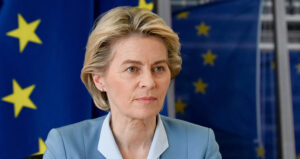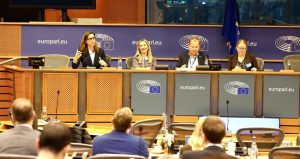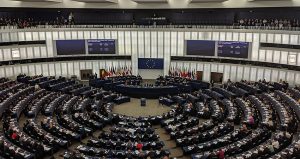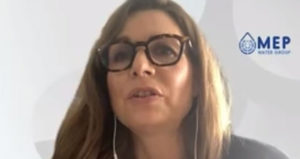MEP’s ask European Commission to step up for water resilience

-
 Esther Rasenberg
Esther Rasenberg
Share article:
The right to clean drinking water is still a priority for the European Parliament. Before Christmas 34 Members of Parliament (MEPs) asked EU Vice-President Raffaele Fitto to step up for the upcoming water resilience strategy. Most MEPs want to reduce the high leakage rates in Europe, accelerate the ban on PFAS and they are against water as a business product. The meeting took place in the European Parliament in Strasbourg on the 16th of December.
Fitto said Member States have to reduce water leakages. “On average, 23% of treated water is lost each year through leaks in distribution networks. In some countries, this goes up to 50%. I therefore urge all Member States to work on the implementation of the Drinking Water Directive provisions as soon as possible.” Fitto promised to look at all aspects of water security in the upcoming water resilience strategy. After hearing the contributions of all parliamentarians, he concluded that only an approach which covers the entire water supply chain will offer long lasting solutions. Fitto also said he is taking the Commission’s role as guardian of the Treaties very seriously. “The Drinking Water Directive will be no exception.”
Rapporteur Thomas Bajada
MEP Thomas Bajada from Malta a member of the Socialists & Democrats Group (S&D) will be the rapporteur for the European Parliament for the Water Resilience Strategy Initiative. He said on Linkedin that he will strive to ensure strong EU standards with flexibility for local needs—’because no one should choose between rent, health, or water’. During the debate he said access to clean drinking water is increasingly under threat. “Across Europe, pollution, climate change and deepening inequalities are putting this right at risk. We must act now to improve access to drinking water while safeguarding sustainability and equity for all citizens across the EU.”
Water is not profit
Bajada also referred to the alarming presence of PFAS in 94% of EU drinking water samples. He emphasized that Europe needs a holistic and legally binding European water resilience strategy. “The time is now to establish robust EU standards, but with the needed flexibilities to adapt to local realities. We must act boldly, tackle pollution at its source, effectively implement EU water quality standards across all Member States for both surface and groundwater, invest in resilient infrastructure and ensure affordability. Water is not profit – it’s a lifeline for people. Europe must lead in safeguarding this fundamental right.”
Water and peace
Viktória Ferenc from the Patriots for Europe Group said climate change, pollution and unsustainable agricultural practices are all seriously threatening our water resources. “Water supply is energy intensive. The economic crisis affecting industry in Europe, to which the war also contributed, is only making access to drinking water more expensive for European people.” MEP Danuše Nerudová (European’s People’s Party, EPP) from Czechia warned that there is a risk that future conflicts will be about access to drinkable water. “This is not just about human rights anymore. Access to water is a matter of global security and geopolitical stability.” Her view reflects the UN Water campaign Leveraging water for Peace.
Plea for sanctions against Member States
MEP Majdouline Sbai from the Verts/ALE group was calling for sanctions against states that do not implement the Drinking Water Directive and distribute water contaminated with nitrates. For Clausen from The Left Group said that the right on drinking water is threatened by chemicals such as pesticides and PFAS. “You should give priority to the environment over the industrial sector and its economic interests.” According to MEP Μαρία Ζαχαρία, who is not attached to a political group the Greek government is supporting policies that undermine the right of citizens to clean, cheap and sufficient water. According to her the revival of the Acheloos River diversion project with European Union money violates European laws, destroys Natura 2000 areas and ignores sustainable management. She calls on the European Union to intervene to ensure compliance with European Directives.
Coherent European policies
MEP Vytenis Povilas Andriukaitis (S&D) asked Fitto to implement a common strategy among the European Commissioners. “This is not just a matter for you, but also for the Commissioner for Health, the Commissioner for the Environment, and many others. It is clear that we have to address these problems among the 27 countries, also thinking about the need to create reserves of drinking water when droughts strike and we need to react and provide assistance quickly.”

















